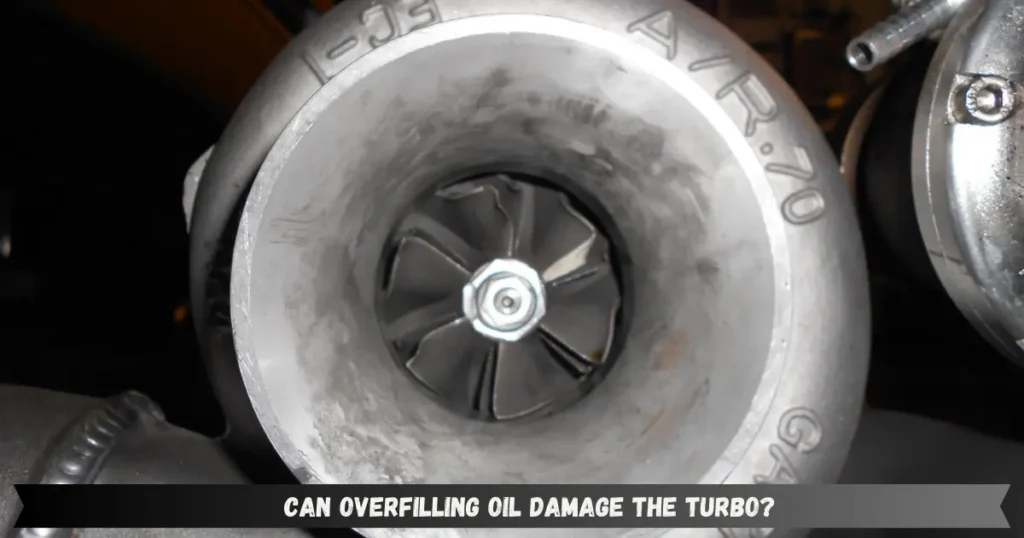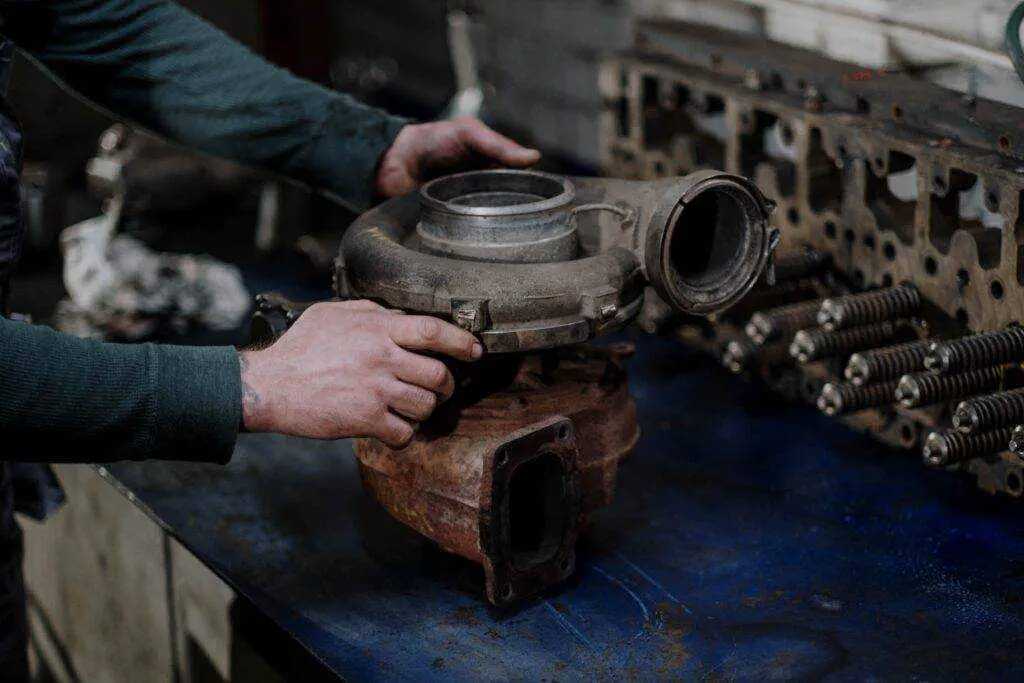Overfilling the engine oil is never a good idea, but Can Overfilling Oil Damage the Turbo? This debated question gets different answers depending on who you ask. If a turbo has failed and the engine oil is overfilled, it’s easy to blame the excess oil. However, in most cases, overfilled oil alone won’t directly damage a functional turbocharger. Some specific scenarios exist where too much oil can lead to turbo failure.
How Does a Turbocharger Work?
Before diving into whether overfilled oil damages turbos, it helps to understand what a turbocharger does and how it operates.
A turbocharger is essentially a small turbine connected to the exhaust manifold spun by the engine’s exhaust gases. As the turbo spins, it drives a compressor on the cold side that packs more air into the engine. This allows more fuel to be burned, increasing power and performance.
Inside the turbo is a shaft with a turbine wheel on one end and a compressor impeller on the other. The shaft spins on bearings that need constant oil flow for lubrication and cooling. Engine oil is fed to the turbo through a pressure line and returned to the oil pan via a drain line. The turbo relies on receiving the proper amount of oil to function.
Can Overfilling Oil Damage the Turbo?
The short answer is that overfilled oil alone will rarely directly damage a turbocharger. However, there are a few specific ways excess oil can lead to turbo failure:

1. Weak Turbo Seals
If the turbo seals are already worn out or compromised, overfilled oil can push past the seals causing oil leakage. This will allow pressurized oil into places it’s not supposed to be, like the intake tract or intercooler piping. The root causes here are worn seals and/or excessive crankcase pressure from too much oil, rather than purely being overfilled.
2. Clogged Oil Return Line
Can Overfilling Oil Damage the Turbo? In very overfilled cases, the turbo’s oil return line back to the oil pan can get clogged with oil. This prevents oil from draining out of the turbo, causing oil backup and over-lubrication of the bearings. However, if the engine oil level is overfilled, damage would likely occur to the internals before the turbo.
3. Increased System Pressure
Excessive oil in the crankcase can raise system oil pressure. If the pressure gets high enough, it could hypothetically burst seals inside the turbo and force oil past gaskets. But again, very high oil levels would need to be present.
Can Overfilling Oil Damage the Turbo? As you can see in each scenario, there are usually compounding factors at play besides solely being overfilled. Worn turbo components, already high pressures, or extremely overfilled conditions have to be present for damage to occur.
Signs of a Failing Turbocharger
How can you tell if your turbo is failing or damaged? Here are some common symptoms:
- Loss of power – Can’t reach higher RPMs or turbo lag is excessive
- Blue/grey smoke from exhaust – Indicates oil is getting burned
- Oil in intercooler system – Often from failed turbo seals
- Unusual noise when accelerating – Faulty turbo bearings
- Check engine light – Sensor detects boost or airflow issues
If you notice any of these symptoms, have your turbo inspected by a professional. They can test compressor and turbine function to determine if a turbo is still healthy or failing.
What About Low Oil Levels?
Interestingly, running an engine too low on oil is far more likely to damage a turbocharger than being overfilled. Without sufficient oil, turbo bearings and shafts can overheat, seize up, and fail catastrophically.
Many turbocharger manufacturers specify a maximum time the turbo can run safely with insufficient oil. For example, Garrett, a popular turbo brand, says their units can run for about 1 minute with inadequate oiling before damage occurs.
How Much Oil Overfill is Acceptable?
Can Overfilling Oil Damage the Turbo? Most experts agree that up to 1 quart or .95 liters of extra oil over the full mark generally won’t cause issues. It’s best to err slightly on the high side than risk running too low. Much beyond this, and you risk potential problems from foam buildup and high system pressures.
Pay close attention next oil change to avoid overfilling. If you check your dipstick and find you’re well over the full mark, carefully drain out excess oil with a suction device until at the proper level.
Can Wrong Oil Viscosity Hurt the Turbo?
Using the incorrect oil viscosity for your engine can also negatively impact the turbocharger. Thicker, higher viscosity oil may not flow properly through the small turbo oil lines, starving the turbo bearings of oil.
Conversely, too thin and light of oil might not adequately coat bearings or provide sufficient protection under high heat conditions. Always use the manufacturer’s recommended oil viscosity and grade for your particular engine and turbo application.
FAQs on Can Overfilling Oil Damage the Turbo?
Can overfilling oil cause turbo damage?
In most cases, slightly overfilled oil alone won’t directly damage a healthy turbocharger. Issues arise when seals are already worn or oil levels are well over the full mark. Overfilled oil can potentially lead to clogged return lines, increased system pressures, and failed seals in vulnerable turbos.
What happens if I overfill the engine oil?
Up to 1 quart over the full mark is often okay but beyond that risks foam buildup, high pressures, oil leaks, fouled spark plugs, and engine performance issues. Badly overfilled engines can suffer from oxygenation, oil aeration, and even hydro lock.
What causes damage to the turbo?
Lack of oil flow, contaminated oil, overheating, excessive carbon buildup, worn bearings/seals, broken turbo blades, and foreign object damage can all damage turbochargers. Maintaining proper oiling and filtration prevents most turbo issues.
Does engine oil affect the turbo?
Yes, the turbo relies on clean engine oil for lubrication and cooling. Insufficient oil flow will damage the turbo. Oil must also be changed regularly as old, dirty oil won’t properly protect the turbo. Using the wrong viscosity oil can hinder oil flow.
How much oil overfill is ok?
Most experts consider up to 1 quart or .95 liters over the full mark acceptable, with minimal risks. Beyond this, potential issues go up as crankcase pressures increase. Any amount over the full line should be addressed promptly.
Can the wrong oil cause turbo failure?
Using the incorrect viscosity oil for your particular engine can lead to turbo failure over time. Oil that is too thick may not flow properly and can starve the turbo of lubrication. Oil too thin may not adequately coat bearings under high heat conditions.
The Bottom Line – Can Overfilling Oil Damage the Turbo?
In summary, overfilled oil by itself does not commonly cause turbocharger failure in otherwise healthy units. However, it can contribute to issues in specific situations:
- If turbo seals are worn, overfilled oil can push past seals
- Extreme overfills can clog turbo drain lines and over-lubricate
- Excess oil raises system pressures, stressing components
- Lack of oil is far harder on turbos than being overfilled
Can Overfilling Oil Damage the Turbo? While a slight overfill around 1 quart is usually okay, it’s ideal to maintain the proper oil level. Use quality oil at the vehicle manufacturer’s recommended viscosity, and have your turbo inspected if symptoms pop up. With proper maintenance, a turbocharger should provide years of reliable boost.





